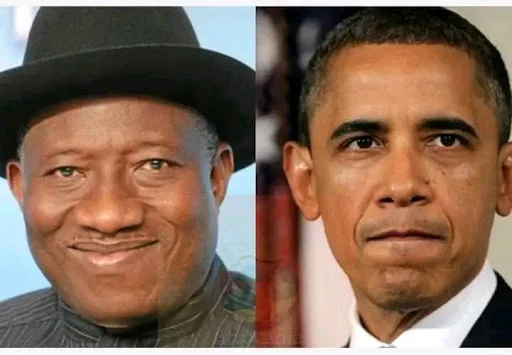By Hagxy Don
In a shocking revelation, former President Goodluck Jonathan has alleged that his refusal to embrace what he described as "Agege laws" led to his political downfall, orchestrated by former U.S. President Barack Obama. The ex-Nigerian leader, often criticized for his perceived weakness in handling national affairs, insists that his decision was guided by moral conviction and the protection of African values.
"Many people call me a weak man because I allowed peace to reign, but my ambition was never worth the blood of my countrymen, women, and children," Jonathan stated. He recounted how he was contacted by Obama, who presented policies purportedly beneficial to Nigeria and Africa.
"I took time to read through and found them very helpful for sustainable development. I was already on the move to make Nigeria one of the richest economies in the world, focusing on agriculture and technology instead of solely relying on petroleum. But as I read further, I found one awful condition—embracing and implementing Agege laws, which would permit a man to have relations with another man," he revealed.
According to Jonathan, this demand clashed with the fundamental values of African societies. Seeking counsel from like-minded leaders, he reached out to the late Zimbabwean President Robert Mugabe. Mugabe's response, he said, was in the form of a parable: "A man who submits his shtting point has lost credibility to sit in the council of men."*
Undeterred, Jonathan also consulted Ugandan President Yoweri Museveni, known for his strong stance against such policies. "He didn’t even let me finish before bursting into laughter. He asked me, ‘Ebele, do you want to see your countrymen on diapers?’ We both laughed, but at that moment, I drew my conclusion," Jonathan recounted.
Determined to uphold Nigeria's cultural and moral values, he informed Obama that he could not implement the Agege laws in his country. Jonathan claimed Obama's response was a chilling warning: "The West will take care of you."
Shortly after, Jonathan lost the 2015 presidential election to Muhammadu Buhari in what many described as an unprecedented shift in Nigerian politics. While he chose to accept defeat gracefully, this new revelation suggests that powerful external forces played a significant role in his political downfall.
The former president’s claims, if true, paint a troubling picture of foreign interference in African governance, raising questions about the extent to which global superpowers manipulate leadership transitions to align with their ideological interests.

